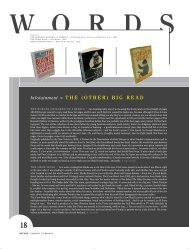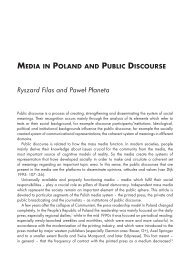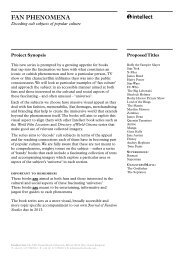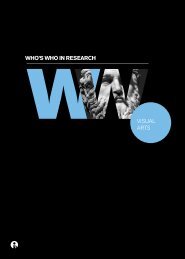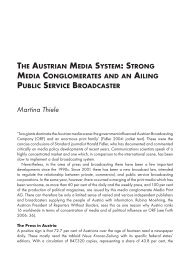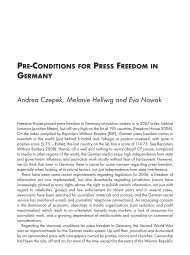Anthem - Intellect
Anthem - Intellect
Anthem - Intellect
Create successful ePaper yourself
Turn your PDF publications into a flip-book with our unique Google optimized e-Paper software.
Signifying Europe<br />
The hymn confirms the emblematic position of the ‘Great Composer’<br />
Beethoven within a mythology of ‘Great Europeans’. But by excluding<br />
Schiller’s lyrics from its performance, the hymn refuses the ritual,<br />
established since the first modern national hymns, of using a single<br />
voice to express a community of citizens. This paradox has sometimes<br />
been felt to represent a failure, a sign of the ‘unfinished’ character of the<br />
symbol. But at the same time it may be taken to suggest the openness of<br />
Europe. In this sense, the hymn signifies Europe’s refusal to adopt a fixed<br />
identity, and marks a deliberate break with nationalist discourses. 419<br />
Buch sees two possibilities. Either Europe copies national symbols in defining<br />
European identity through a gesture of excluding all others: ‘strangers, immigrants,<br />
other states, other continents, the excluded of all sorts—all that “whole world” that<br />
was united in the universal brotherhood Schiller and Beethoven sang of ’. Or else,<br />
Europe could be faithful to the unfinished anthem in striving to remain a land of<br />
hospitality and openness. 420 The whole discussion about this anthem thus links back<br />
to central and unresolved dilemmas for renewing a transnational European identity.<br />
There is a great political problem in how to integrate the experience of brutal wars and<br />
of Nazi genocide in Europe’s historically anchored identity. Beethoven’s Ninth can be<br />
heard to do precisely that, as did in a way the Europa myth. Whether Karajan’s anthem<br />
manages to do the same is open to debate.<br />
With Foucault or Adorno, one may perhaps want to step out of the interpretive<br />
entanglement and refrain from offering any new meaning for this tune, but rather<br />
respond to it with silence. Cook and Žižek walk another way and instead offer new<br />
and critical interpretations as their method to go against ideological uses of the music.<br />
This is also in line with Paul Ricoeur’s recurring hermeneutical argument that the<br />
only way to react to problematic readings of a text is by proposing better ones, and<br />
thus to contribute to the unstoppable conflict of interpretations. This is precisely what<br />
I have strived to do here as well.<br />
A brief look at how the anthem has been received indicates that some voices have<br />
really found it difficult to accept a song that was venerated by Nazi Germany as well<br />
as by apartheid Rhodesia under Ian Smith. In 2008 European Parliament, Jim Allister<br />
(NI, UK) was one of the few who went against both the anthem and the flag:<br />
Ode to Joy which we are going to purloin may be a very nice tune, but<br />
so is Jingle Bells and like Jingle Bells it heralds a fantasy, the fantasy<br />
that the EU is good for you. But unlike Jingle Bells, it will damage your<br />
national sovereignty and the right to control your own destiny. More,<br />
like code to destroy, than Ode to Joy. 421<br />
180




